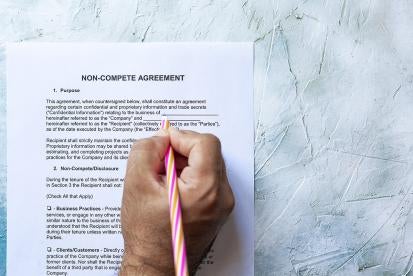On June 8, 2022, Colorado Governor Jared Polis signed Colorado House Bill 22-1317 (the “Bill”), which was passed by the Colorado Legislature on May 10, 2022. Effective 90 days from the end of the legislative session – on August 10, 2022 – Colorado will join the ranks of Illinois, Washington, and other states that have prohibited non-competes for employees earning below a certain wage threshold. Colorado, which has a notable recent history of hostility towards non-competes – including the threat of criminal penalties – is also poised to now impose significant financial penalties on employers for violating the Bill.
The Bill voids “any covenant not to compete that restricts the right of any person to receive compensation for performance of labor for any employer,” unless the individual is a “highly compensated worker[]” – a threshold that begins at $101,250 in 2022, and will be adjusted annually by the Colorado Department of Labor. Colorado’s new limit is in-line with the very top of the “low wage” non-compete thresholds set by Washington state and Oregon.
The Bill’s prohibitions will also apply to customer non-solicits, but excludes employees earning equal to or greater than 60% of the highly compensated threshold – roughly $60,750 in 2022.
Confidentiality provisions relevant to the employer’s business are still permissible under the Bill, as long as they do not prohibit disclosure of information relating to the worker’s “general training, knowledge, skill, or experience, whether gained on the job or otherwise.” Additionally, covenants for the purchase and sale of a business are also still permissible.
Notably, the Bill states that an employer may now be “liable for actual damages and a penalty of five thousand dollars per worker or prospective worker harmed by the conduct. The Attorney General and any worker or prospective worker harmed by an employer’s conduct may bring an action for injunctive relief and to recover penalties.” Critically, the Bill does not define what constitutes “harm” in this context, or how an employee will prove “actual damages,” which will likely lead to significant questions and disputes between employers and employee’s-counsel.
All restrictive covenants must be provided to a prospective employee before they accept their offer of employment, and to a current employee at least 14 days before the effective date of the covenant. All notices of a restrictive covenant must: (1) be provided with a copy of non-compete; (2) identify the agreement by name and state that the agreement contains a non-compete; and (3) direct the worker to specific sections or paragraphs of the agreement that contain the non-compete.
Finally, as we have seen in other states, the Bill proclaims an employee who primarily resides in Colorado may not be required to adjudicate the validity of their non-compete outside of Colorado. However, in light of the Supreme Court’s Atlantic Marine Construction Co., Inc. v. United States District Court for the Western District of Texas, 571 U.S. 49 (2013) decision, the enforceability of this provision is questionable.
Fortunately for employers, the Bill only applies to covenants entered into or renewed on or after the Bill’s effective date.





 i
i

